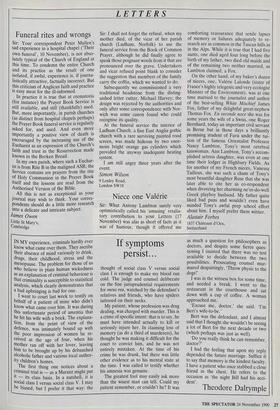If symptoms persist... IN MY experience, criminals hardly ever know
what came over them. They ascribe their absence of mind variously to drink, drugs, their childhood, stress and the menopause. The problem for those of us who believe in plain human wickedness as an explanation of criminal behaviour is that criminality is susceptible to statistical analysis, which clearly demonstrates that a bad upbringing is bad for one.
I went to court last week to testify on behalf of a patient of mine who didn't know what came over him. It was during this unfortunate period of amentia that he hit his wife with a brick. The explana- tion, from the point of view of the defence, was intimately bound up with the poor impression of women he re- ceived at the age of four, when his mother ran off with her lover, leaving him to be brought up by his debauched alcoholic father and various local author- ity children's homes.
The first thing one notices about a Friminal trial is — as a Marxist might put it — its class basis. In a nutshell, it is social class I versus social class V. I may be biased, but I prefer it that way: the thought of social class V versus social class I is enough to make my blood run cold. The judge and counsel deliberate on the fine jurisprudential requirements for mens rea, watched by the defendant's relatives and friends, who have spiders tattooed on their necks,
My patient, whose profession was drug dealing, was charged with murder. This is a crime of specific intent: that is to say, he must have intended actually to kill or seriously injure her. In claiming loss of memory (as do a third of murderers), he thought he was making it difficult for the court to convict him, and he was not entirely mistaken. At the time of his crime he was drunk, but there was little other evidence as to his mental state at the time. I was called to testify whether his amnesia was genuine.
The greatest fool may easily ask more than the wisest man can tell. Could my patient remember, or couldn't he? It was as much a question for philosophers as doctors, and despite some fierce ques- tioning I insisted that there was no test available to decide between the two possibilities. Prosecuting counsel mur- mured despairingly, 'Throw physic to the dogs!'
I was in the witness box for some time, and needed a break. I went to the restaurant in the courthouse and sat down with a cup of coffee. A woman approached me.
'Excuse me, doctor,' she said. 'I'm Bert's wife-to-be.'
Bert was the defendant, and I almost said that I thought she wouldn't be seeing a lot of Bert for the next decade or two (which perhaps was just as well). `Do you really think he can remember, doctor?'
I had the feeling that upon my reply depended the future marriage. Suffice it to say that memory is the kindest faculty. I have a patient who once stabbed a close friend in the chest. He refers to the occasion as 'the night Bill had his acci- dent'.
Theodore Dalrymple


































































 Previous page
Previous page